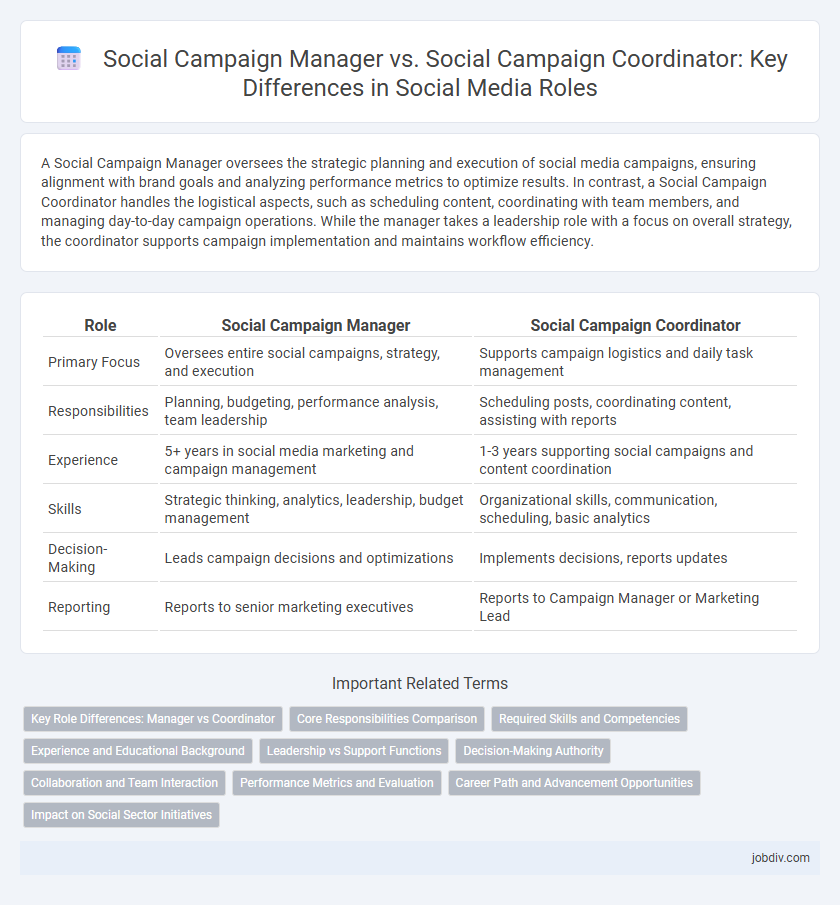A Social Campaign Manager oversees the strategic planning and execution of social media campaigns, ensuring alignment with brand goals and analyzing performance metrics to optimize results. In contrast, a Social Campaign Coordinator handles the logistical aspects, such as scheduling content, coordinating with team members, and managing day-to-day campaign operations. While the manager takes a leadership role with a focus on overall strategy, the coordinator supports campaign implementation and maintains workflow efficiency.
Table of Comparison
| Role | Social Campaign Manager | Social Campaign Coordinator |
|---|---|---|
| Primary Focus | Oversees entire social campaigns, strategy, and execution | Supports campaign logistics and daily task management |
| Responsibilities | Planning, budgeting, performance analysis, team leadership | Scheduling posts, coordinating content, assisting with reports |
| Experience | 5+ years in social media marketing and campaign management | 1-3 years supporting social campaigns and content coordination |
| Skills | Strategic thinking, analytics, leadership, budget management | Organizational skills, communication, scheduling, basic analytics |
| Decision-Making | Leads campaign decisions and optimizations | Implements decisions, reports updates |
| Reporting | Reports to senior marketing executives | Reports to Campaign Manager or Marketing Lead |
Key Role Differences: Manager vs Coordinator
A Social Campaign Manager oversees the strategic planning, execution, and analysis of social media campaigns, ensuring alignment with broader marketing goals and managing team collaboration. In contrast, a Social Campaign Coordinator focuses on the operational aspects such as scheduling content, monitoring platform performance, and supporting the Manager by handling day-to-day campaign logistics. The Manager holds decision-making authority and budget control, while the Coordinator provides critical execution support and administrative assistance.
Core Responsibilities Comparison
Social Campaign Managers oversee the development, execution, and optimization of social media strategies, managing budgets, analyzing performance metrics, and leading campaign teams to achieve targeted engagement and conversion goals. Social Campaign Coordinators support these efforts by handling day-to-day operational tasks such as content scheduling, coordinating with creative teams, monitoring social channels, and compiling performance reports. While Managers focus on strategic decision-making and leadership, Coordinators ensure smooth campaign implementation and timely communication across departments.
Required Skills and Competencies
A Social Campaign Manager requires advanced strategic planning, data analysis, and leadership skills to design, execute, and optimize complex social media campaigns that drive measurable business outcomes. In contrast, a Social Campaign Coordinator focuses on strong organizational abilities, attention to detail, and proficiency in scheduling, content management, and reporting to support campaign implementation and monitor performance metrics. Both roles demand expertise in social media platforms, digital marketing tools, and effective communication to align campaigns with brand objectives and audience engagement.
Experience and Educational Background
A Social Campaign Manager typically requires 3-5 years of experience in digital marketing or social media management, often accompanied by a bachelor's degree in marketing, communications, or a related field. In contrast, a Social Campaign Coordinator usually has 1-2 years of experience, with educational backgrounds focusing on entry-level marketing or social media certifications. Managers lead strategy development and campaign execution, while Coordinators support day-to-day campaign tasks and data tracking.
Leadership vs Support Functions
A Social Campaign Manager leads strategy development, overseeing campaign execution and performance metrics to ensure alignment with business goals. In contrast, a Social Campaign Coordinator supports the manager by handling day-to-day logistics, content scheduling, and cross-team communication. The manager's role emphasizes leadership and decision-making, while the coordinator focuses on operational support and task management.
Decision-Making Authority
Social Campaign Managers hold primary decision-making authority, overseeing strategy development, budget allocation, and major campaign adjustments. Social Campaign Coordinators support execution by managing logistics and reporting but typically lack autonomy in strategic decisions. The distinction in authority impacts responsibility levels and the scope of influence within social media marketing teams.
Collaboration and Team Interaction
Social Campaign Managers lead strategic planning and coordinate cross-functional teams to ensure campaign goals align with overall marketing objectives, fostering collaboration through clear communication and leadership. Social Campaign Coordinators support team interaction by managing day-to-day tasks, tracking progress, and facilitating information flow between team members to maintain workflow efficiency. Both roles emphasize strong interpersonal skills and teamwork to drive successful social media campaigns and optimize engagement outcomes.
Performance Metrics and Evaluation
Social Campaign Managers oversee the overall strategy and performance metrics, analyzing key indicators like engagement rates, conversion rates, and ROI to optimize campaign effectiveness. Social Campaign Coordinators focus on collecting and reporting real-time data, tracking daily social media analytics, and supporting adjustments to meet short-term goals. Both roles collaborate on performance evaluation but differ in scope, with managers driving strategic insights and coordinators managing operational metrics.
Career Path and Advancement Opportunities
Social Campaign Managers typically hold leadership roles overseeing campaign strategy and team coordination, offering greater responsibility and higher salary potential compared to Social Campaign Coordinators. Social Campaign Coordinators often start with entry-level tasks such as scheduling content and tracking campaign metrics, serving as a stepping stone toward management positions. Advancing from Coordinator to Manager requires developing skills in strategic planning, data analysis, and team leadership to unlock broader career growth within social media marketing.
Impact on Social Sector Initiatives
Social Campaign Managers drive strategic planning and execution of social sector initiatives, ensuring campaigns align with organizational goals and deliver measurable community impact. Social Campaign Coordinators support implementation by managing day-to-day operations, coordinating outreach efforts, and facilitating communication across stakeholders to optimize campaign reach. The manager's leadership shapes overall campaign direction, while the coordinator enhances operational efficiency, together amplifying social impact outcomes.
Social Campaign Manager vs Social Campaign Coordinator Infographic

 jobdiv.com
jobdiv.com